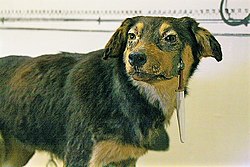| Ivan Petrovich Pavlov | |
| 伊万·彼得罗维奇·巴甫洛夫 | |
| | |
伊万·彼得罗维奇·巴甫洛夫(俄语:Иван Петрович Павлов,1849年9月26日-1936年2月27日),俄罗斯生理学家、心理学家、医师。他因对狗研究而首先对古典制约作出描述而著名,并在1904年因为对消化系统的研究得到诺贝尔生理学或医学奖。
生平与研究
巴甫洛夫出生在俄罗斯的梁赞,父亲是东正教的一名牧师。他刚开始是一位神学院的学生,但后来退出,1870年进入圣彼得堡大学学习自然科学。在1879年得到博士学位。大学毕业时,获金质奖章。后在德国学习两年。
在1890年代,巴甫洛夫研究了狗的胃,透过唾腺来研究在不同条件下对食物的唾液分泌。他注意到狗在食物送进嘴里之前便开始分泌口水,并开始研究这个他所称的"灵魂分泌液"。他认为这些现象比起唾液的化学成分更加有趣,于是便改变了他的研究焦点。以调整食物出现之前的刺激来开始一连串的实验。因此建立了他所称的条件反射(如唾液分泌受动物先前的经验而制约)。这些实验在1890年代和1900年代透过翻译被介绍到西方科学界,但直到1927年才有完整的英文书籍出版。
巴甫洛夫是一位在工作和习惯上非常规律的实验操作者,他准时地在12点整吃午餐、每天晚上准时在同样的时间睡觉、每天准时喂他的狗,并且每年的同一天离开列宁格勒(圣彼得堡)前往爱沙尼亚。如此的习惯直到他因为他的儿子维克多(Victor)在俄罗斯白军运动中过世而失眠为止。
不同于许多革命前的俄国科学家,巴甫洛夫受到苏联政府的高度认可,且能够继续他的研究直到相当大的年纪。 巴甫洛夫承认本身并不热衷于马克思主义,但由于诺贝尔奖得奖者的身份,被视为有价值的政治资产。当他在1923年从第一次美国访问归国之后(第二次在1929年),他公然的指责共产主义,认为国际马克思主义的思想基础是错误的,并说“我不会为了你们所做的社会实验牺牲一只青蛙的后腿!”。1927年,巴甫洛夫更是写信给斯大林,称他是“俄国人的耻辱”。 1934年谢尔盖·基洛夫被谋杀后,巴甫洛夫写了几封信给莫洛托夫,批评这样的迫害,并希望重新考虑关于几个他所认识的人的案件。
晚年巴甫洛夫试着用制约理论去建立关于诱发神经官能症的的实验模型。1936年在列宁格勒过世,他的实验室受到安全的保存。直到死前巴甫洛夫依然神志清醒,且继续他的研究。他要求一位学生坐在他的床边纪录他迈向死亡的详细情形,想要建立关于他生命最后一段时间的主观经验的独特证明。
1936年2月27日,巴甫洛夫因双肺炎去世,享年86岁。人们为他举行了隆重的葬礼,为了纪念他,他的实验室被当做博物馆保存了下来。
反射系统研究
巴甫洛夫在生理学、神经科学、心理学的许多领域皆有贡献。他主要的研究是性格(temperament)、古典制约和非自愿反射动作(involuntary reflex actions) 。
巴甫洛夫在关于消化系统的实验使他获得了1904年的诺贝尔生理学或医学奖。实验包括了在外科手术上取出动物消化系统的部分,切断神经束来判定影响,还有在消化器官和外部囊袋(pouch)之间植入瘘管(fistula)以测试器官的内容。这些研究成为许多消化系统研究的基础。
之后在反射动作的研究中,研究了对于压力和痛苦的非自愿反应。巴甫洛夫在研究中延伸四种性格定义:“冷静”(phlegmatic)、“暴躁”(choleric)、“乐观”(sanguine)、“忧郁”(melancholic)。巴甫洛夫和他的研究员展开对转换边缘的抑制(TMI)的观察与研究,TMI指身体天生对压力和痛苦的崩溃反应。这些研究显示了所有性格型态对刺激如何做出在时间上长短有所不同的相同反应。他认为"最基本的遗传差异... 是他们多快达到崩溃点与神经系统在快速到达崩溃的基本差异。
荣格继续巴甫洛夫在TMI的研究,并以人类的内向与外向性格型态来观察动物崩溃的形式。他相信内向的人,比起外向的人对于刺激更敏感,且更容易到达TMI状态。这些研究产生了新名词高度敏感者。
威廉·萨甘等人继续对心智的制约、记忆移入和洗脑进行行为学研究。
后记
随着巴甫洛夫的古典制约在西方流行,尤其经由约翰·布罗德斯·华生的著作而广为人知,制约的自动学习型态成为当时发展中的专业研究比较心理学的重要观念,与行为主义的重要研究方法。英国哲学家伯特兰·罗素是对巴甫洛夫精神哲学的热衷拥护者。
巴甫洛夫的制约反射研究不但在科学界,也在大众文化有着广泛的影响力。“巴甫洛夫的狗”用来形容一个人反应不经大脑思考;巴甫洛夫的制约成为奥尔德斯·伦纳德·赫胥黎的反乌托邦小说《美丽新世界》主题。而在托马斯·品钦的小说《万有引力之虹》中也占有分量。
一般人都相信巴甫洛夫使用了铃铛的声音作为食物出现的讯号,然而在纪录中他使用了包括哨子、节拍器、音叉和一些视觉上的刺激。1994年,卡塔尼亚对巴甫洛夫是否曾在实验中使用过铃铛声表示怀疑。
他的妻子是他大学同学的妹妹,比他小11岁。
巴甫洛夫的理论虽然对行为主义心理学有重大影响,不过他本人就不太愿意被视为心理学家。
参见
注释
- ^ 巴甫洛夫是传统译名,只有Иван Петрович Павлов才被译为巴甫洛夫,其他Павлов译作帕夫洛夫。参考自:《世界人名翻译大辞典》1993年10月版,新华通讯社译名室编,中国对外翻译出版公司出版,ISBN 7-5001-0221-6
- ^ 巴甫洛夫在《大英百科全书》在线版的页面 (英文)
- ^ Новиков Ю. Ю. Первый российский Нобелевский лауреат Иван Петрович Павлов (посвящается 100-летию присуждения И. П. Павлову Нобелевской премии). — Москва: Компания Спутник+, 2005. — 92 с..
- ^ The Nobel Prize in Physiology or Medicine 1904. NobelPrize.org. [2020-03-17] (美国英语).
- ^ Anrep, G. V. Ivan Petrovich Pavlov. 1849–1936. Obituary Notices of Fellows of the Royal Society. 1936, 2 (5): 1–18. JSTOR 769124. doi:10.1098/rsbm.1936.0001.
- ^ 6.0 6.1 Cavendish, Richard. Death of Ivan Pavlov. History Today. 2011, 61 (2): 9 [2015-04-26]. (原始内容存档于2018-09-29).
- ^ Chance, Paul (1988). Learning and Behaviour. Wadsworth Pub. Co. ISBN 0-534-08508-3. p. 48.
- ^ Rokhin, L, Pavlov, I & Popov, Y. (1963) Psychopathology and Psychiatry, Foreign Languages Publication House: Moscow.
- ^ Catania, A. Charles (1994); Query: Did Pavlov's Research Ring a Bell?, Psycoloquy Newsletter, Tuesday, 7 June 1994
参考文献
- Todes, D. P. (1997). "巴甫洛夫的生理工厂," Isis. Vol. 88。科学社会的历史,p. 205-246.
- Boakes, R. A. (1984). 从达尔文到行为主义. 剑桥:剑桥大学出版社。
- 巴甫洛夫. (1927). 制约反射. 伦敦: Routledge and Kegan Paul.
- B.G. Firkin & J.A.Whitworth (1987). 医学名人词典. Parthenon出版社. ISBN 1-85070-333-7
Ivan Petrovich Pavlov (Russian: Ива́н Петро́вич Па́влов, IPA: [ɪˈvan pʲɪˈtrovʲɪtɕ ˈpavləf] (![]() listen); 26 September [O.S. 14 September] 1849 – 27 February 1936) was a Russian physiologist known primarily for his work in classical conditioning.
listen); 26 September [O.S. 14 September] 1849 – 27 February 1936) was a Russian physiologist known primarily for his work in classical conditioning.
From his childhood days Pavlov demonstrated intellectual curiosity along with an unusual energy which he referred to as "the instinct for research". Inspired by the progressive ideas which D. I. Pisarev, the most eminent of the Russian literary critics of the 1860s, and I. M. Sechenov, the father of Russian physiology, were spreading, Pavlov abandoned his religious career and devoted his life to science. In 1870, he enrolled in the physics and mathematics department at the University of Saint Petersburg in order to study natural science.
Pavlov won the Nobel Prize for Physiology or Medicine in 1904, becoming the first Russian Nobel laureate. A survey in the Review of General Psychology, published in 2002, ranked Pavlov as the 24th most cited psychologist of the 20th century. Pavlov's principles of classical conditioning have been found to operate across a variety of behavior therapies and in experimental and clinical settings, such as educational classrooms and even reducing phobias with systematic desensitization.

